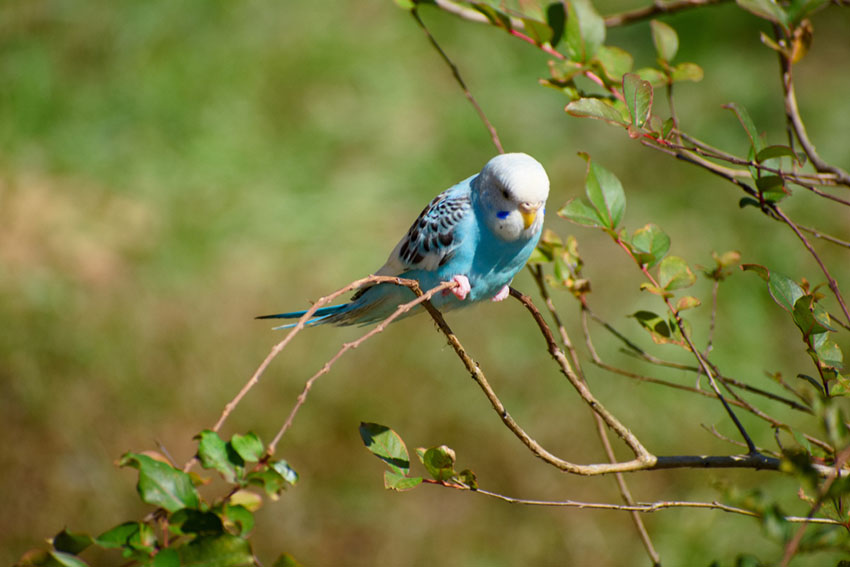If you can’t seem to find your escapee, leave an open, visibly food-filled cage outside your house next to your aviary. Place some of their favourite toys in plain view and, if you don’t happen to have any cage-mates who will help lure them back, try playing some recordings of parakeet chatter. Make sure you have your net and towel at hand to assist a quick capture if they return
If you have bonded with your bird, don’t underestimate the power of your presence. Sit near the cage outside the house and call the bird. Make a recording of your voice to leave playing if you have other things to do.

A lost parakeet is difficult to track down and recapture
Alerting your neighbours that you are missing a budgie. If your bird has been gone for more than a few hours, put up lost parakeet signs around your local area, ideally with a mobile phone number that people can contact you on. If you happen to know of any outdoor aviaries or cages, alert the owners and ask them to keep an eye out for you.
Other than this, all you can do is wait. If your parakeet has been missing for more than 24 hours, don't give up hope. It is possible that your bird has flown far away, but may still find their way back within earshot, where the sounds of your voice and the chatter of other parakeets may yet lure him back.
Rescuing an Escaped Parakeet
If you do, by any chance, manage to find yourself in possession of someone else's parakeet, don't waste any time. There’s lots to do!
You’re pretty unlikely to tempt a parakeet down from a roof or a tree (although this can happen if the bird is very tame or very tired/hungry). Stray birds are more likely to linger around long enough to be caught if you keep your birds in an outdoor aviary. The constant sounds of other birds will cause them to hang back.

An escaped parakeet takes to the wing
When it comes down to it, the only realistic way to catch your bird is with a net. Once captured, the first thing they will need is solitude in a quiet cage. This cage should be equipped with a perch, food and water. If your bird is panicky, don’t cover the cage but rather leave the bird alone for a few hours and let them recover and get used to their surroundings. If they’ve been outside for a significant length of time they’re likely to be tired, hungry and cold.
Never put a stray bird into the same cage as your other birds, a quarantine is good on the off chance that your bird has caught some disease.
Once the bird is secure and fed, put up some “lost parakeet found” posters in the vicinity, and spread the word that you have an escaped parakeet in your keeping. Given the fact that these little birds can fly a surprisingly long way, you may want to put up a notice in the local newspaper, or phone the local radio station with the news. With every lost bird there’s an anxious owner waiting for news, so it is very likely that the owner will soon respond to your efforts.
When the caged parakeet has recovered, you will need to make some judgment calls:
- Does he look injured in any way?
- Are his nostrils (nares) clear? Any crusty material around the cere could indicate illness.
- Is his vent clean? If the feathers in this region are dirty or wet, the parakeet is ill.
- Can you see any parasites on the feathers, or bald patches on the body?
- Are the droppings normal looking? (Note: there is no single ‘normal’ colour for the dark part of parakeet droppings - it depends on their standard diet)
- Is he eating and drinking normally?
- Is the parakeet alert and behaving as you would expect a parakeet to behave?
Even if the bird has an all-clear after being put through this checklist, it's still advisable to take him to a vet’s. Some diseases bloom inside birds with no external clues until it's too late. There’s no point putting your other parakeets at risk.




Comments
Vicky, 25 November 2022
One of our Green parakeet flew away 2 day before and still waiting for him to come back.
Joyce, 2 October 2022
BLUE PARAKEET visiting my bird feeders and ground feeding area First sighting was Sept 22 and again today, Oct 1st.
Sasha, 24 June 2022
My parakeet followed me into the garage when I was getting the groceries out of the car. I had no idea he was behind me! He usually doesnt like to go down the long hallway to the garage, so I didn't think anything of leaving the garage open to get bags out. When I turned around he was above the garage door and flying frantically! I calmly called his name but he still freaked, he flew down and out the garage into the wild open. We live near the mountains where there are hundreds of trees! He flew high above the trees over my neighbors. I have walked for hours calling him. I put my car on the driveway with his cage and favorite toys but nothing. I have called him in the mornings and early evenings. There are chicken hawks nearby and am fearing the worst. I literally cannot sleep or eat. We have had him for 6 years. His name is Bibbel, he can talk and say his name! I am heart broken! We had just gotten back from Hawaii and I think he really missed me so decided to go down the long hallway just to be with me and now he is gone and I feel horrible! I have posted on Nextdoor Lost and Found. I have posted on local animal sites on Facebook. I have put flyers all down the street, talked to random people and nothing. He has never been outside before so I know he is scared. I am broken hearted and literally besides myself. I never ever imagined when we got him as a baby for a pet for my kids that I would be the one to love him so dearly and ended up being his person.
Mary, 11 March 2022
My parakeet flew out of the house last Summer. We found him in a tree but he would not come down. We tried all the tricks that we knew like bringing the cage, trying to get other birds to attract him, and playing his favorite songs and showing his favorite treats. Finally when it was getting dark we decided to get him to fly. We made sure he flew when there were no cars coming down the street. He went from tree to tree until he was so tired that finally he flew to a branch that I was able to get him. We were relieved to get him back. I am glad that The weather was hot. if it was Winter he would not have survived for very long.
Minnah, 24 February 2022
I lost my budgies just today, Thursday 24th 2022. One is a light blue with dark tail and a female with yellow and green. I just came from college and I went to the cage to see the cage door open. I live in UAE so I read this article and I am not sure if this rule would apply.